Podcast
Questions and Answers
Which of the following is not classified as a natural hazard?
Which of the following is not classified as a natural hazard?
- Flooding
- Earthquake
- Chemical explosion (correct)
- Typhoon
What term describes the strengths and resources available within a community?
What term describes the strengths and resources available within a community?
- Hazard
- Vulnerability
- Capacity (correct)
- Exposure
Which of the following best describes vulnerability in a community?
Which of the following best describes vulnerability in a community?
- Characteristics making a community susceptible to hazards (correct)
- The physical presence of people and assets in hazard zones
- The community's strengths and resilience
- The disruption caused by a disaster
Which phenomenon is classified as a climatological hazard?
Which phenomenon is classified as a climatological hazard?
In what way are typhoons, hurricanes, and cyclones different from one another?
In what way are typhoons, hurricanes, and cyclones different from one another?
Which of the following is a biological hazard?
Which of the following is a biological hazard?
What is meant by disaster risk?
What is meant by disaster risk?
Which of the following examples is associated with geological hazards?
Which of the following examples is associated with geological hazards?
What is the primary cause of transport accidents classified as technological hazards?
What is the primary cause of transport accidents classified as technological hazards?
Which type of hazard is characterized by prolonged periods of extreme weather conditions?
Which type of hazard is characterized by prolonged periods of extreme weather conditions?
Flashcards are hidden until you start studying
Study Notes
Hazards and Disasters
- Hazard: A dangerous phenomenon, substance, human activity, or condition that has the potential to cause harm.
- Disaster: A serious disruption of the functioning of a community or society. This can include business closures, property damage, loss of life, and livestock death.
- Vulnerability: Characteristics and circumstances of a community, system, or asset that make it susceptible to the damaging effects of a hazard. Example: houses built near rivers or on mountain slopes.
- Capacity: Strengths, attributes, and resources available within a community, society, or organization to cope with a hazard.
- Exposure: People, property, systems, or other elements present in hazard zones.
- Disaster Risk: The potential for disaster losses in lives, health status, livelihoods, assets, and services.
Hazard Classification
Natural Hazards
Geophysical
- Earthquake: One of the deadliest natural hazards.
- Volcanic Eruption: Causes ground shaking and can trigger tsunamis.
- Liquefaction: Occurs when soil becomes saturated with water, making it lose its strength and flow like a liquid. This is often associated with earthquakes and tsunamis.
- Mass Movement: The downward movement of rock, soil, and debris due to gravity.
- Rockfall: Rapid, sudden detachment of rock from a slope.
- Subsidence: Sinking or settling of the ground surface.
Meteorological
- Typhoons, Tropical Cyclones, Hurricanes: These are all the same phenomenon, with the name depending on the location. They are characterized by low pressure and strong winds.
Hydrological
- Flooding: An overflow of water onto land that is normally dry.
Climatological
- Drought: A prolonged period of abnormally low rainfall, leading to water shortages.
- Extreme Temperatures:
- Heat Wave: Prolonged periods of excessively hot and humid weather.
- Cold Wave/Extreme Cold: Prolonged periods of excessively cold weather.
- Wildfire: Uncontrolled burning fire outdoors, caused by natural or human activities. Also known as a bushfire or forest fire.
- Urban Fire: A fire occurring in urban areas, involving buildings.
- El Niño and La Niña: Climate patterns that influence weather globally.
Biological
- Epidemics: Outbreaks of diseases that spread rapidly among a population. Examples: Avian Flu, Ebola, Cholera, Malaria, Dengue, Measles, COVID-19, HIV/AIDS, Meningitis, Tuberculosis.
- Animal/Insect Infestation: Outbreaks of diseases or pests affecting animals. Example: African Swine Fever (ASF)
Technological/Manmade Hazards
Industrial Accidents
- Accidents originating from technology, industrial procedures, infrastructure failures, or human activities.
- Explosions: Chemical or nuclear explosions.
Transport Accidents
- Accidents involving mechanized modes of transport.
- Air, Boat, Rail, and Motor Vehicle Accidents
Studying That Suits You
Use AI to generate personalized quizzes and flashcards to suit your learning preferences.




